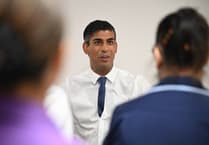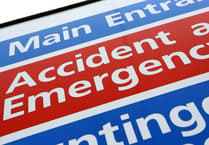WITH the announcement of the badger cull being extended to farms across the South Hams, protesters have rushed to organise protests, rallies and the mysterious ‘badger patrols’.
Badger patrols are cropping up across the area, and activists have plans to patrol all lands identified as taking part in the controversial cull.
The Gazette were invited to spend an evening on badger patrol, and so I went along, hoping to learn what motivates activists to wander our lonely footpaths seven nights a week.
And so I met up with the group of ten at a supermarket car park in Totnes on a grey Tuesday evening, to find them chatting to a couple of police liaison officers.
Tony, a retired accountant has been heavily involved in badger patrols for four years. He lives near Exeter, and is currently co-ordinating groups across the region, spending three nights a week on patrol in Somerset, and three in the South Hams.
‘Thursday is my night off - I’m learning to play the drums,’ Tony said.
When I asked what the main aim of tonight’s badger patrol is, he explained: ‘To make our presence known. There are a lot of people out there who oppose the cull, and we’re here to represent them.
‘We are part of a massive group of people - scientists, conservationists and animal welfare experts who oppose the cull on scientific, moral and humane grounds.’
And when asked about the police presence, Tony said: ‘The police were awful for the first few years, we were getting stopped and searched all the time. ‘But now they’ve got their act together and we have two police liaison officers who look out for our wellbeing and welfare.’
High-visibility jackets were handed out, but we were advised not to put them on until we reached the footpath, so as not to draw attention to ourselves.
The group then split into two, and we drove in convoy up to the village of Ashprington, the location of a recent heated protest against the badger cull.
The activists have chosen these lands as a focus because the Sharpham Estate has vaccinated all badgers on their lands, and they believed that neighbouring farmers had signed up to the cull.
‘The marksmen will try to lure the badgers onto their lands, or even trespass to try and get their numbers up. They get paid by the number of badgers they kill. In Somerset it used to be £30 a badger, but I think it’s now £20.
‘Some of them will do anything they can to get their numbers up, even picking up roadkill badgers from the roads,’ Tony explained.
We parked up, walked up through the village, passed the pub and down a public right of way towards Sharpham Woods, as dusk fell around us.
The group was a mixture of ages and backgrounds, but united by a passionate for wildlife, and exposing what they feel to be ‘this crazy focus on badgers.’
‘The main focus shouldn’t be on badgers, the main focus should be on the cattle. Cattle to cattle transmission accounts for some 94 per cent of the increase in spread of TB,’ Tony told me.
Maz had travelled up from Plymouth for the evening and is a committed animal rights activist, having previously campaigned against everything from ‘dolphin hunting in Japan, to research bears in Minnesota.’
‘There are lots of farmers who don’t support the cull, but they’re afraid of saying so,’ Maz said.
‘But the government are supporting the farmers that are pro-cull, because the NFU have lobbied so hard for this cull. I’m not a veggie or vegan, but I still have a voice. I’ve recently given up dairy because of this cull,’ Maz added.
As darkness fell, the torches came out, and various members of the group spent time inspecting hedgerows for signs of badgers.
‘We walk the footpaths, legally and peacefully, to show our opposition to the cull in the most visible and powerful way we can.
‘We monitor the activities of the cull operatives, since in other zones, patrol members have found illegal activity such as snares, sett blocking and even gassing,’ Tony explained.
As we walked down a narrow overgrown green lane towards Sharpham Woods, we stopped in a gateway, and looked out across the creek, where the River Harbourne meets the River Dart.
In the distance, across the river, one of the group pointed out a vehicle in a field, with a red laser shining out across the land.
The vehicle disappeared into the darkness fairly quickly, but the group felt they had spotted something significant - possibly illegal shooting.
‘It could be the scope on a gun. If you hit an animal’s eyes with it, they freeze,’ Fiona said.
The group then spotted little red lights and torch lights across the valley in the distance, several miles away.
Tony located a grid reference on his tablet, and reported the sighting of a high-powered rifle to fellow activists at the end of a phone.
The decision was then made to call the police’s non-emergency number to report what they suspected to be illegal shooting.
‘There’s a scope light and a torch light. We haven’t heard any shots. But it’s very clear what we’re looking at,’ Tony explained.
When Tony was questioned on his ‘knowledge of guns,’ he said: ‘I know what to look for, I was in the army - if that helps!’
The group were advised that the police were treating it as an emergency and would be getting somebody to check it out.
‘I believe it to be a public safety issue - we’re in the area, t’s a high-powered rifle, they have a range of three miles and we’re too close for comfort,’ Tony said.
We walked further down the hill, towards the woods, but it wasn’t long before headlights appeared out of the darkness, and a police car turned up.
‘How did you get down here?’ the officer asked, clearly bemused at the fluorescent-clad group congregated in a hedgerow.
‘The same way you did.’ Tony explained.
The police asked lots of questions, but the vehicle with the red laser had long gone - and all that remained were some ‘red dots’ far away across the valley.
The officer asked for confirmation if they were part of the ‘Morrison’s group.’
‘We’re no trouble,’ Tony smiled.
The officer inspected various lights dotted across the valley from the gate. But when he took to explaining how lights viewed at night can be deceiving, it became clear that Tony’s initial report of a red laser scope was doubted.
It all ended fairly amicably, and the officer drove off into the night, with the warning: ‘If I get any reports from farmers of people with torchlights around here, we’ll know that it was you - with this being your last location.’
‘You’d have thought we were talking about flying saucers,’ Tony said after he’d gone.
‘Did you see how he tried to discredit us all the way through? And why did they drive straight to us, and not to where we reported the lights?
‘I don’t think they were investigating the firearm. They were investigating us.’
At 10.30pm, we arrived back in Ashprington, with our high-visibility jackets back in the bags. I said my farewells, as Tony and the group set off for the second part of their patrol.
Speaking to Tony a few days later, I questioned what motivates him to dedicate so much time and effort to activism, driving hundreds of miles each week across two counties, he said: ‘There are many people who don’t like the idea of a national treasure being killed.
‘The badger is the most benign creature you can find. They’re innocent, and I’ll say that until my dying day.’



